索尼的企业文化概述(英文版)
索尼的企业文化

索尼的企业文化引言概述:索尼作为一家全球知名的科技公司,其企业文化一直以来都备受关注。
本文将从五个大点来阐述索尼的企业文化,包括创新精神、员工发展、客户导向、社会责任和团队合作。
通过详细阐述每个大点下的小点,我们可以更好地了解索尼的企业文化。
正文内容:1. 创新精神1.1 技术创新:索尼一直致力于技术创新,不断推出具有颠覆性的产品和解决方案,如Walkman、PlayStation等。
1.2 创新文化:索尼鼓励员工提出创新思想,并为其提供良好的创新环境,包括鼓励试错、支持创新项目等。
2. 员工发展2.1 培训与发展:索尼注重员工培训和发展,提供各种培训计划和机会,帮助员工不断提升技能和职业素养。
2.2 激励机制:索尼设立了激励机制,通过奖励和晋升来激励员工的工作表现,激发员工的积极性和创造力。
3. 客户导向3.1 产品质量:索尼始终将产品质量放在首位,致力于为客户提供高品质的产品和服务。
3.2 用户体验:索尼注重用户体验,通过用户反馈和市场研究来改进产品设计和功能,以满足客户需求。
4. 社会责任4.1 环境保护:索尼积极参与环境保护活动,致力于减少对环境的影响,推动可持续发展。
4.2 社会公益:索尼积极参与社会公益事业,通过捐赠和志愿者活动来回馈社会,关注弱势群体的福利。
5. 团队合作5.1 协作精神:索尼倡导团队合作,鼓励员工之间的合作和互助,以实现共同的目标。
5.2 开放沟通:索尼鼓励员工开放沟通,倾听和尊重每个人的意见和建议,促进团队的协作和创新。
总结:综上所述,索尼的企业文化体现了创新精神、员工发展、客户导向、社会责任和团队合作等方面的特点。
通过不断的技术创新和员工培训,索尼不仅为客户提供高品质的产品和服务,还积极关注环境保护和社会公益事业。
团队合作和开放沟通也是索尼企业文化的重要组成部分。
索尼的企业文化为其持续发展和成功奠定了坚实的基础。
索尼企业文化

索尼企业文化索尼是一家全球知名的跨国科技公司,总部位于日本东京。
作为一家领先的创新者,索尼一直致力于提供创造性的产品和服务,以满足人们的需求和激发他们的想象力。
索尼的企业文化是公司成功的重要基石,它体现了公司的价值观、行为准则和工作方式。
1. 价值观:索尼的核心价值观是“创新、品质、责任”。
创新是索尼永恒的追求,公司鼓励员工不断创新,推动科技进步。
品质是索尼产品的基石,公司致力于提供卓越的产品和服务,以满足客户的期望。
责任是索尼对社会和环境的承诺,公司积极参与社会公益事业,并努力实现可持续发展。
2. 行为准则:索尼的行为准则是指导员工行为的规范,包括但不限于以下几个方面:- 诚信:员工应以诚实、透明和道德的方式开展工作,遵守法律法规和公司政策。
- 尊重:员工应尊重他人的权利和尊严,建立和谐的工作环境。
- 协作:员工应积极合作,促进团队合作和共享知识。
- 创新:员工应鼓励创新思维,提出改进和创新的建议。
- 客户导向:员工应始终以客户为中心,提供优质的产品和服务。
3. 工作方式:索尼鼓励员工发挥个人才能,提供良好的工作环境和发展机会。
公司重视员工的培训和职业发展,通过内部培训、外部培训和跨部门交流等方式,帮助员工不断提升能力和技能。
索尼倡导开放的沟通和合作,鼓励员工分享知识和经验,促进团队的创新和成长。
4. 成果与奖励:索尼重视员工的贡献和成果,通过绩效评估和奖励制度来激励员工的工作表现。
公司设立了一系列的奖励和福利计划,包括年终奖金、股权激励计划、健康保险和员工福利等,以回报员工的努力和贡献。
总结:索尼企业文化凝聚了公司的核心价值观、行为准则和工作方式。
通过创新、品质和责任的引领,索尼不断推动科技进步,满足客户的需求。
公司注重员工的发展和福利,鼓励开放的沟通和合作,营造良好的工作环境。
索尼致力于成为一个负责任的企业,通过积极参与社会公益事业和实现可持续发展,为社会做出贡献。
索尼的企业文化

索尼的企业文化索尼是一家全球知名的跨国科技公司,总部位于日本东京。
作为一家创新型企业,索尼一直以来注重塑造和维护其独特的企业文化,这种文化在公司的各个方面都起到了重要的作用。
本文将详细介绍索尼的企业文化,包括其核心价值观、沟通方式、工作环境和员工发展等方面。
1. 核心价值观索尼的核心价值观是“创新、挑战和激情”。
这三个关键词体现了索尼对于技术创新的追求、对于不断挑战自我的精神以及对于工作的热情。
创新是索尼的灵魂,公司鼓励员工勇于尝试新事物,推动技术的发展和进步。
挑战则代表了索尼对于自我突破的追求,鼓励员工超越自我,不断追求卓越。
激情是索尼员工工作的动力,公司鼓励员工积极投入工作,追求个人和团队的成功。
2. 沟通方式索尼倡导开放和透明的沟通方式。
公司鼓励员工之间的交流和合作,提倡团队合作精神。
在索尼,员工可以随时与同事分享想法、提出问题或寻求帮助。
此外,索尼还鼓励员工与管理层进行直接沟通,公司高层领导经常与员工进行面对面的交流和讨论,以了解员工的意见和建议,促进公司的改进和发展。
3. 工作环境索尼致力于为员工提供积极、创新和多元化的工作环境。
公司注重员工的福利和工作满意度,提供灵活的工作安排和福利待遇,以吸引和留住优秀的人才。
索尼鼓励员工在工作中展现自己的才华和创造力,提供良好的培训和发展机会,帮助员工实现个人和职业目标。
此外,索尼还重视员工的健康和工作与生活的平衡,提供健康管理和员工福利计划,营造一个积极向上的工作氛围。
4. 员工发展索尼注重员工的发展和成长。
公司提供全面的培训计划和职业发展机会,帮助员工不断提升自己的技能和知识。
索尼鼓励员工参与各种培训课程、研讨会和学习活动,以拓宽自己的视野和提高专业素质。
此外,索尼还鼓励员工参与项目和团队合作,提供跨部门和跨国界的机会,帮助员工在全球范围内发展自己的职业生涯。
总结:索尼的企业文化以创新、挑战和激情为核心价值观,鼓励员工勇于创新、超越自我,并对工作充满激情。
索尼企业文化

索尼企业文化索尼是一家全球知名的跨国科技公司,总部位于日本东京。
作为一家领先的电子产品制造商,索尼以其创新、高质量和卓越的品牌声誉而闻名。
索尼的企业文化是公司成功的重要因素之一,它塑造了公司的价值观、行为准则和工作环境。
1. 价值观和使命:索尼的价值观是“创新、挑战、激情”。
公司致力于通过不断创新和挑战传统来满足客户的需求,并以激情和才华推动技术的进步。
索尼的使命是通过创造令人兴奋的体验,丰富人们的生活。
2. 精益求精:索尼鼓励员工在工作中追求卓越。
公司注重细节和质量,致力于提供最优质的产品和服务。
员工被鼓励参与持续改进和创新,以不断提高工作效率和产品质量。
3. 多元化和包容性:索尼重视多元化和包容性,认为不同的观点和经验可以促进创新和发展。
公司致力于为员工提供公平和平等的机会,鼓励他们发挥自己的才华和潜力。
索尼鼓励员工尊重和欣赏不同文化背景和观念的多样性。
4. 社会责任:索尼致力于成为一个负责任的企业公民。
公司积极参与社区发展和环境保护,推动可持续发展。
索尼关注教育、文化和社会福利等领域,通过捐赠和志愿者活动回馈社会。
5. 员工发展:索尼重视员工的成长和发展。
公司提供广阔的职业发展机会和培训计划,帮助员工提升技能和知识。
索尼鼓励员工不断学习和自我提升,以适应快速变化的科技行业。
6. 创新和研发:索尼将创新视为推动公司发展的关键。
公司投入大量资源用于研发和创新,推动技术的进步和产品的改进。
索尼鼓励员工提出新的想法和解决方案,并支持他们将创意转化为实际的产品和服务。
7. 团队合作:索尼鼓励员工之间的合作和团队精神。
公司提倡开放的沟通和共享知识,以促进团队的协作和效率。
索尼重视员工之间的互信和支持,鼓励团队成员相互帮助,共同实现目标。
8. 客户导向:索尼始终将客户放在首位,致力于满足客户的需求和期望。
公司通过深入了解客户,提供个性化的解决方案和优质的售后服务,建立长期稳定的客户关系。
总结:索尼的企业文化体现了公司对创新、质量、多元化和社会责任的高度重视。
索尼的创新企业文化

索尼的创新企业文化索尼,这个在全球范围内享有盛誉的科技公司,自1946年成立以来,一直以其卓越的产品质量和持续的创新精神引领着全球的科技产业。
这一切的成功,都源于索尼独特且富有创新精神的企业文化。
一、索尼的企业文化:激情创新,追求卓越索尼的企业文化以“激情创新,追求卓越”为核心。
公司鼓励每一位员工积极提出新的想法和观点,不畏挑战,勇于尝试。
这种创新精神深深根植于索尼的企业文化中,使得公司始终保持在行业的前沿,不断推出引领行业潮流的新产品。
二、鼓励尝试,宽容失败在索尼,失败是被看作是成功的阶梯。
公司鼓励员工大胆尝试,即使在面对失败时也不会被指责,反而会被鼓励并给予新的机会去尝试。
这种对待失败的态度,使得员工敢于去尝试新的想法和创新,推动了公司的持续进步。
三、尊重个体,激发潜力索尼的企业文化中深深地体现了对个体的尊重和重视。
公司相信每一个员工都有其独特的才华和能力,只要给予足够的支持和激励,就能激发出他们的潜力。
这种尊重个体的文化,使得员工有强烈的归属感和责任感,从而更愿意发挥自己的才能,为公司的成功贡献力量。
四、全球化视野,社会责任索尼的企业文化也强调全球化视野和社会责任。
公司不仅在全球范围内提供高质量的产品和服务,也积极投身于社会公益事业,以实际行动回馈社会。
这种视野和责任感,使得索尼在公众中赢得了广泛的好感和尊重。
总结:索尼的创新企业文化是其持续成功的关键因素。
这种文化鼓励创新、尊重个体、激发潜力、追求卓越,并具有全球化视野和社会责任感。
正是这样的企业文化,使得索尼能够在科技行业中保持领先地位,不断推出令人瞩目的新产品,并且在社会中也获得了广泛的认可和尊重。
对于那些希望在创新中取得成功的公司来说,学习索尼的企业文化是值得借鉴的。
日本索尼公司转型期创新发展研究引言随着科技的迅速发展,全球电子消费品市场面临着巨大的变革。
在这个转型的关键时期,日本索尼公司(Sony Corporation)面临着巨大的挑战与机遇。
索尼的企业文化

索尼的企业文化索尼是一家全球知名的电子产品和娱乐公司,拥有独特而独特的企业文化。
其企业文化的核心价值观是创新、品质和忍耐力。
索尼致力于通过创新和技术突破来满足客户的需求,并提供优质的产品和服务。
1. 创新:索尼一直以来都将创新作为企业文化的核心。
公司鼓励员工提出新的想法和解决方案,鼓励他们勇于尝试新的方法和技术。
索尼鼓励员工参与创新项目,提供资源和支持,以推动技术和产品的发展。
2. 品质:索尼对产品品质的追求是企业文化的重要组成部分。
公司注重每个产品的细节和质量控制,确保产品符合高标准。
索尼致力于提供令人满意的用户体验,通过不断改进和创新来满足客户的期望。
3. 忍耐力:索尼的企业文化中强调了忍耐力的重要性。
公司认识到创新和发展是一个长期的过程,需要耐心和毅力。
索尼鼓励员工在面对挑战和困难时保持积极的态度,并努力克服障碍。
索尼的企业文化还体现在以下方面:1. 多元化和包容性:索尼鼓励员工来自不同的背景和文化,公司重视多元化和包容性。
这种多元化的文化促进了创新和新思维的涌现,使得索尼能够更好地满足不同地区和不同市场的需求。
2. 管理扁平化:索尼倡导管理扁平化的企业文化,鼓励员工和管理层之间的开放沟通和合作。
这种扁平化的管理结构使得决策更加迅速和灵活,促进了团队合作和创新的发展。
3. 社会责任:索尼积极履行企业社会责任,关注环境保护和社会福利。
公司致力于减少环境影响,推动可持续发展。
索尼还通过慈善捐赠和社区项目来回馈社会,积极参与社会公益事业。
总结:索尼的企业文化以创新、品质和忍耐力为核心价值观,鼓励员工的创造力和创新精神。
公司注重产品品质和用户体验,致力于满足客户的需求。
索尼的企业文化还体现了多元化和包容性、管理扁平化以及社会责任等方面。
这些特点使得索尼成为一家具有竞争力和积极影响力的企业。
索尼企业文化
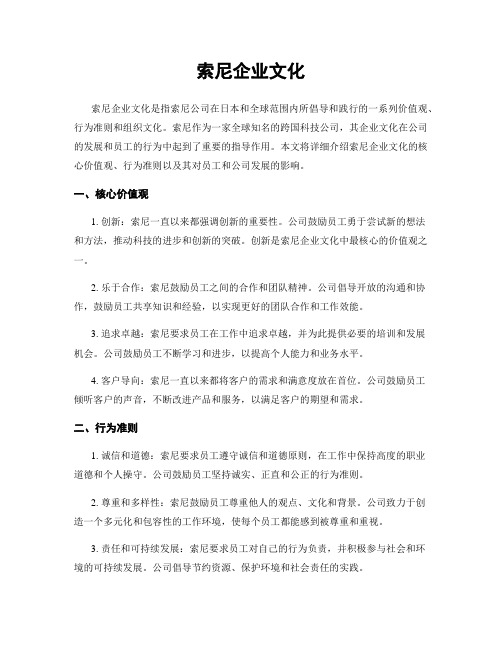
索尼企业文化索尼企业文化是指索尼公司在日本和全球范围内所倡导和践行的一系列价值观、行为准则和组织文化。
索尼作为一家全球知名的跨国科技公司,其企业文化在公司的发展和员工的行为中起到了重要的指导作用。
本文将详细介绍索尼企业文化的核心价值观、行为准则以及其对员工和公司发展的影响。
一、核心价值观1. 创新:索尼一直以来都强调创新的重要性。
公司鼓励员工勇于尝试新的想法和方法,推动科技的进步和创新的突破。
创新是索尼企业文化中最核心的价值观之一。
2. 乐于合作:索尼鼓励员工之间的合作和团队精神。
公司倡导开放的沟通和协作,鼓励员工共享知识和经验,以实现更好的团队合作和工作效能。
3. 追求卓越:索尼要求员工在工作中追求卓越,并为此提供必要的培训和发展机会。
公司鼓励员工不断学习和进步,以提高个人能力和业务水平。
4. 客户导向:索尼一直以来都将客户的需求和满意度放在首位。
公司鼓励员工倾听客户的声音,不断改进产品和服务,以满足客户的期望和需求。
二、行为准则1. 诚信和道德:索尼要求员工遵守诚信和道德原则,在工作中保持高度的职业道德和个人操守。
公司鼓励员工坚持诚实、正直和公正的行为准则。
2. 尊重和多样性:索尼鼓励员工尊重他人的观点、文化和背景。
公司致力于创造一个多元化和包容性的工作环境,使每个员工都能感到被尊重和重视。
3. 责任和可持续发展:索尼要求员工对自己的行为负责,并积极参与社会和环境的可持续发展。
公司倡导节约资源、保护环境和社会责任的实践。
4. 安全和健康:索尼关注员工的安全和健康,提供安全的工作环境和相关的培训。
公司鼓励员工关注自身健康,并提供相应的福利和支持。
三、对员工的影响索尼企业文化对员工产生了积极的影响:1. 激发创新思维:索尼鼓励员工勇于创新和实验,为员工提供了一个积极的创新环境。
员工可以充分发挥自己的想象力和创造力,推动科技的进步和产品的创新。
2. 培养团队合作精神:索尼倡导员工之间的合作和团队精神,鼓励员工共同努力,共同实现目标。
索尼公司英文简介

索尼公司英文简介1. company profileSony Corporation is in the world the civil/specialized seeing and hearing product, the communication product and the information technology and so on one of domain forerunners, it in music, the film and television and the computer entertainment operation service aspect achievement also causes it to become one of global biggest comprehensive entertainment companies.The company in cuts off in 2001 fiscal year merge sales volumes which finished to March 31, 2002 achieved 57,000,000,000 US dollars, the global employee total achieve more than 150,000 people. Face in 2005 soon the true arrival wide band network time, Sony Corporation continuously devotes in constructs a perfect hardware, the content service and the network environment, enables the consumer to be possible to enjoy the alone charm anytime and anywhere the entertainment content and the service.In order to realize this dream world, the Sony group the electron, the game and the entertainment locates for the company three big core business domain, further advances the management resources the centralism.2. Nescafe business historyIn 1945, after World War II, Masaru Ibuka started a radio repair shop in a bombed-out building in Tokyo.[4] The next year he was joined by his colleague Akio Morita, and they founded a company called Tokyo Tsushin Kogyo K.K.[5], which translates in English to Tokyo Telecommunications Engineering Corporation. The company built Japan's first tape recorder called the Type-G.[6]In the early 1950s, Ibuka traveled in the United States and heard about Bell Labs' invention of the transistor.[7] He convinced Bell to license the transistor technology to his Japanese company. While most American companies were researching the transistor for its military applications, Ibuka looked to apply it to communications. While the American companies Regency and Texas Instruments built transistor radios first, it was Ibuka's company that made the first commercially successful transistor radios.In August 1955, Sony produced its first coat-pocket sized transistor radio they registered as the TR-55 model.[8] In 1956, Sony reportedly manufactured about 40,000 of its Model TR-72 box-like portable transistor radios and exported the model to North America, the Netherlands and Germany.That same year they made the TR-6, a coat pocket radio which was used by the company to create its "SONY boy" advertising character.[9] The following year, 1957, Sony came out with the TR-63 model, then the smallest (112 × 71 × 32 mm) transistor radio in commercial production. It was a worldwide commercial success.[10]University of Arizona professor Michael Brian Schiffer, Ph.D., says, "Sony was not first, but its transistor radio was the most successful. The TR-63 of 1957 cracked open the U.S. market and launched the new industry of consumer microelectronics." By the mid 1950s, American teens had begun buying portable transistor radios in huge numbers, helping to propel the fledgling industry from an estimated 100,000 units in 1955 to 5,000,000 units bythe end of 1958. However, this huge growth in portable transistor radio sales that saw Sony rise to be the dominant player in the consumer electronics field[11] was not because of the consumers who had bought the earlier generation of tube radio consoles, but was driven bya distinctly new American phenomenon at the time called Rock and Roll.3. corporate structureCompany announcement, the company executives, executive vice President and chief financial officer, kato, executive vice President and chief strategy officer cane side, will be fully responsible for SONY group finance, corporate strategy and business strategy. In terms of electronic business, besides kato and cane, executive vice President of the company executive and fundamental chapter 2 will be responsible for technical strategy, executive vice President of the company executive and suzuki are will be responsible for product strategy. The team will take responsibility in SONY's electronics business renewal, help horizontal well and the business group and operating functions of the platform and the unity cooperation, to speed up the recovery of SONY's electronics business operations.4.Core productVarious core business domain all has face the wide band network time explicit mission, through enhances the rentability and the brand value two aspects unceasingly continues the enhancement company diligently the competitive power.In the electronic service aspect, Sony's goal becomes the leader who the network expense electronic products domain deserves, provides the fill charm electronic hardware product to the consumer which all may use with wishes fulfilled in the family and the motion environment.In the game service aspect, further will devel op “Play Station” the service, the game category which the surmounting former people understood, will create a wide band network time the electronic entertainment brand-new industry.In the entertainment service domain, besides Hollywood, Sony will devote in manufactures the high standard in global each different area the entertainment content, and will distribute in the global scope. In strengthens various core business competitive power unceasingly in the foundation, Sony positively is also attempting establishes each kind of wide band network time the brand-new business model.In order to further strengthen between electronic, the game and the entertainment service relation, enhances the group overall value, in April, 2002 Sony officially had been established the network application and the content service department (NACS-Network Applications & Content Service).NACS will take Sony's content service domain with take the electronic hardware as the central area of technology bridge, will attempt in the Sony innate network platform carries out the service.And in order to let the user community personal feel exciting the open wide band network environment as soon as possible the change which lives for the people brings, Sony positively with will also have the communal development idea enterprise to carry on the elastic alliance (strategic cooperation). The Sony group has many kinds of different service domain, is an extremely unique enterprise.Sony will be full uses own service structure the characteristic, through with the field other enterprise's mutual cooperation, willbecome the wide band network time to eagerly anticipate the tidal current the media and the technical company.5.Regional distribution scaleSony (China) the limited company expands unceasingly to China invests, Sony has at present surpassed 800,000,000 US dollars in the Chinese total investment cost, after this is continues in 2001 the total investment cost surpassed 500,000,000 US dollars unceasingly increases the investment the most recent data.Sony will invest the high speed growth tendency in China which and the localization developed still to continue. Settles down in the Jiangsu Province Wuxi country high technology and new technology industry development zone Sony electron (Wuxi) the limited company, took Sony in China's important production base, at first 2,300 ten thousand US dollars investment costs gradually grew to near 100,000,000 US dollars, becomes the Sony acceleration native place service development the important place of origin.Shanghai Rope Broad Electron Limited company is Sony the first joint venture which sets up in China, for many years always obtains the outstanding enterprise which the government approves highly.Since 2003, the rope broad electron has gone into production one after another has reached the dozens of funds the digital camera, the digital camera new product and new generation of large capacity Memory Stick the Pro memory stick and so on the new product, among, the digital camera output estimated achieves last year in 2003 fiscal years 10 times.Beginning sets up (Huizhou) the limited company also from sets up in Guangdong's Sony precision part its total investment 1,624 ten thousand US dollars to grow one after another in recent years to 5,500 ten thousand US dollars, already became in the world one of large-scale optics production bases.。
索尼企业文化

索尼企业文化索尼是一家全球知名的跨国科技公司,总部位于日本东京。
作为一家领先的创新企业,索尼一直以来注重培养和传承企业文化,以推动公司的发展和员工的成长。
一、核心价值观1. 创新:索尼鼓励员工不断创新,挑战传统观念,推动科技进步,为客户提供更好的产品和服务。
2. 品质:索尼追求卓越品质,致力于生产高品质的产品,以满足客户的需求和期望。
3. 诚信:索尼坚持诚实、正直和透明的原则,与客户、合作伙伴和员工建立信任关系。
二、员工关怀1. 健康与安全:索尼致力于为员工提供安全、健康的工作环境,通过培训和设施改善确保员工的工作安全。
2. 平等与多样性:索尼重视员工的平等和多样性,鼓励员工相互尊重、包容和合作,创造一个公正和开放的工作环境。
3. 员工发展:索尼提供广阔的职业发展机会和培训计划,鼓励员工不断学习和成长,实现个人与公司共同发展。
三、社会责任1. 环境保护:索尼致力于减少对环境的影响,通过节能减排、资源回收和环保技术创新等方式,推动可持续发展。
2. 社区参与:索尼积极参与社区公益活动,关注社会问题,为社区居民提供支持和帮助。
3. 教育支持:索尼重视教育的重要性,通过捐赠、赞助和志愿者活动等方式,支持教育事业的发展。
四、沟通与合作1. 开放沟通:索尼倡导开放、透明和及时的沟通,鼓励员工积极表达意见和建议,促进团队合作与创新。
2. 跨部门合作:索尼鼓励不同部门之间的合作与交流,促进知识共享和资源整合,提高工作效率和创造力。
3. 国际合作:索尼积极推动国际合作,与全球各地的合作伙伴共同创造更多的商业机会和价值。
五、企业精神1. 持续进取:索尼鼓励员工勇于追求卓越,不断超越自我,为实现公司的长远目标而努力奋斗。
2. 客户导向:索尼始终将客户的需求放在首位,不断提升客户满意度,为客户提供优质的产品和服务。
3. 社会创造:索尼积极创造社会价值,通过技术创新和社会责任实践,为社会发展做出贡献。
总结:索尼企业文化以创新、品质和诚信为核心价值观,注重员工关怀、社会责任、沟通与合作,以及持续进取、客户导向和社会创造的企业精神。
用英文介绍索尼相机的作文
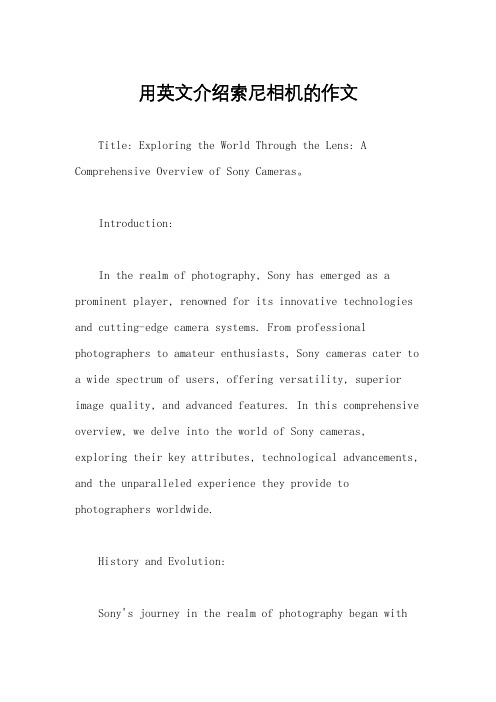
用英文介绍索尼相机的作文Title: Exploring the World Through the Lens: A Comprehensive Overview of Sony Cameras。
Introduction:In the realm of photography, Sony has emerged as a prominent player, renowned for its innovative technologies and cutting-edge camera systems. From professional photographers to amateur enthusiasts, Sony cameras cater to a wide spectrum of users, offering versatility, superior image quality, and advanced features. In this comprehensive overview, we delve into the world of Sony cameras, exploring their key attributes, technological advancements, and the unparalleled experience they provide to photographers worldwide.History and Evolution:Sony's journey in the realm of photography began withthe launch of its first digital camera in the late 20th century. Since then, the company has continuously pushed the boundaries of innovation, introducing groundbreaking technologies that redefine the photography landscape. From the iconic Alpha series to the compact yet powerful RX lineup, Sony has consistently delivered cameras that combine performance with portability, revolutionizing the way we capture and preserve moments.Key Technological Advancements:One of the defining features of Sony cameras is their incorporation of cutting-edge technology, aimed at enhancing the photography experience. The adoption of mirrorless technology has been a game-changer, enabling cameras to achieve compact form factors without compromising on image quality. Sony's proprietary Exmor sensors deliver stunning clarity and detail, even in low-light conditions, ensuring that every shot captures the essence of the moment.The integration of advanced autofocus systems, such asFast Hybrid AF, has redefined the speed and accuracy of focusing, allowing photographers to seize the perfect shot with ease. Additionally, Sony's commitment to continuous innovation is evident in features like Eye AF, which automatically detects and tracks subjects' eyes, ensuring sharp focus and captivating portraits.Furthermore, Sony's collaboration with Zeiss lenses has resulted in the creation of optics that boast exceptional sharpness, contrast, and color reproduction, elevating the quality of images captured with Sony cameras to unprecedented levels.Product Lineup:Sony offers a diverse range of cameras tailored to meet the varying needs and preferences of photographers. The Alpha series encompasses flagship models like the Alpha 1, renowned for its unmatched speed, resolution, and video capabilities, making it the ultimate choice for professional photographers and videographers alike.For enthusiasts seeking a compact yet powerful solution, the RX series presents an enticing array of options, suchas the RX100 VII, which combines exceptional image quality with pocket-sized portability, perfect for capturingfleeting moments on the go.Additionally, Sony's commitment to inclusivity is evident in its lineup of entry-level cameras, such as the Alpha 6000 series, which provides novice photographers with an accessible entry point into the world of interchangeable lens cameras, without compromising on performance or features.Conclusion:In conclusion, Sony cameras represent the pinnacle of photographic innovation, embodying a perfect fusion of cutting-edge technology, superior craftsmanship, and user-centric design. Whether you're a seasoned professional oran amateur enthusiast, Sony offers a camera to suit every style, preference, and creative vision. With Sony camerasas your trusted companion, you embark on a journey ofexploration, discovery, and endless possibilities, capturing the beauty of the world one frame at a time.。
索尼的品牌管理概述(英文版)(ppt 56页)
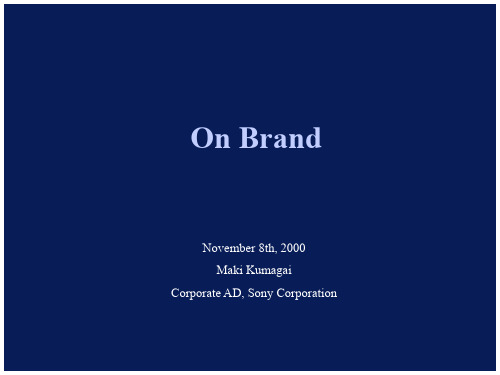
We invite new thinking, so even more fantastic ideas can evolve.
Creativity is our essence. We take chances. We exceed expectations.
We help dreamers dream.
2000.11.2 Corporate AD
Digital Dream Kids 1996 ~
Digital Dream Kids are ourselves
In this Digital Era, we are a group of people mesmerized by new digital technologies, and continues dream and remain curious just as we were when we were kids!
We do not copy. We do things that no one else has done.
Masaru Ibuka
2000.11.2 Corporate AD
Brand Concept
Business Platform
Brand Essence
“What We Do”
Digital Dream Kids
Product Category Brand ……Trinitron, Walkman, Vaio etc. Brands which encompass, endorse and organize
multiple products/services
2000.11.2 Corporate AD
Corporate Brand ……Sony
索尼企业文化

索尼企业文化索尼企业文化是指索尼公司在经营和管理过程中所秉持的核心价值观、行为准则以及组织文化。
索尼作为一家全球知名的跨国科技公司,其企业文化在塑造公司形象、激励员工、推动创新和实现可持续发展方面起着重要的作用。
1. 核心价值观索尼公司的核心价值观是“挑战、创新、激情”。
这体现了索尼对于技术创新和持续进步的追求,以及对于员工激情和团队合作的重视。
索尼鼓励员工勇于面对挑战,不断创新,以推动公司的发展和市场竞争力的提升。
2. 行为准则索尼公司制定了一系列行为准则,以指导员工在工作中的行为和决策。
这些准则包括:- 诚实守信:员工应该诚实守信,遵守法律法规和道德规范,保护公司和客户的利益。
- 尊重和多样性:员工应该尊重他人,包括不同背景、文化和观点的人,并创造一个多样性和包容性的工作环境。
- 安全和环保:员工应该关注安全和环境保护,积极采取措施减少对环境的影响,并确保员工的安全和健康。
- 质量和客户满意度:员工应该追求卓越的质量,满足客户的需求和期望,建立长期的合作关系。
3. 组织文化索尼公司秉承着开放、创新和合作的组织文化。
公司鼓励员工提出新的想法和创新,推动技术和产品的发展。
索尼注重团队合作和跨部门协作,鼓励员工分享知识和经验,以实现共同的目标。
公司还提供培训和发展机会,匡助员工不断成长和提升能力。
4. 索尼的社会责任作为一家具有社会责任感的企业,索尼致力于可持续发展和社会贡献。
公司积极推动环境保护和资源节约,减少碳排放和废物产生。
索尼还积极参预社会公益事业,支持教育、文化和科技创新等领域的发展。
5. 企业文化的影响索尼企业文化的塑造对公司的发展和员工的激励起着重要的作用。
这种文化鼓励员工追求卓越,推动创新,使得索尼能够不断推出具有竞争力的产品和服务。
同时,索尼的企业文化也匡助建立了一个积极向上、充满活力和多样性的工作环境,吸引了优秀的人材加入公司。
总结:索尼企业文化以挑战、创新和激情为核心价值观,通过行为准则和组织文化的传承,塑造了一个开放、创新和合作的工作环境。
索尼企业文化

索尼企业文化索尼是一家全球知名的跨国科技公司,总部位于日本东京。
该公司以创新、品质和卓越的产品而闻名,其企业文化也是其成功的重要因素之一。
索尼秉持着一系列核心价值观和原则,这些价值观和原则贯穿于公司的各个方面,包括组织结构、员工关系、产品开发和社会责任等。
1. 创新精神:索尼一直以来都以创新为核心驱动力。
公司鼓励员工提出新的想法和创意,并为他们提供一个积极的工作环境,以促进创新的发展。
索尼鼓励员工参与创新项目,提供资源和支持,以实现他们的创意。
公司还鼓励员工参与行业内的创新活动,并与其他公司和组织进行合作,共同推动科技创新。
2. 产品质量:索尼一直以来都致力于提供高品质的产品和服务。
公司设有严格的质量管理体系,确保产品符合最高的标准和客户的期望。
索尼注重细节和精益求精的态度,不断改进产品设计和制造过程,以提供卓越的用户体验。
公司还鼓励员工关注客户反馈,并及时做出改进,以确保产品质量的持续提升。
3. 人才培养:索尼重视员工的个人发展和成长。
公司提供广泛的培训和发展机会,以帮助员工提升技能和知识,并实现职业目标。
索尼鼓励员工参与内部培训课程、外部研讨会和行业活动,以拓宽视野和增加专业知识。
公司还注重培养团队合作精神和领导能力,以激励员工发挥潜力并实现个人和组织的共同目标。
4. 社会责任:索尼始终致力于履行企业的社会责任。
公司积极参与社区和环境保护活动,推动可持续发展。
索尼通过各种方式回馈社会,包括捐赠资金、物资和技术,支持教育、文化和公益事业。
公司还注重推动多元化和包容性,鼓励员工关注社会公正和人权问题,并积极参与相关倡议和活动。
5. 客户导向:索尼始终将客户放在首位,致力于满足客户的需求和期望。
公司通过市场调研和客户反馈,不断改进产品和服务,以提供更好的用户体验。
索尼注重建立良好的客户关系,倾听客户的声音,并根据客户的反馈做出相应的改进和调整。
公司还鼓励员工关注客户需求的变化和趋势,以保持竞争优势和市场领先地位。
索尼简介
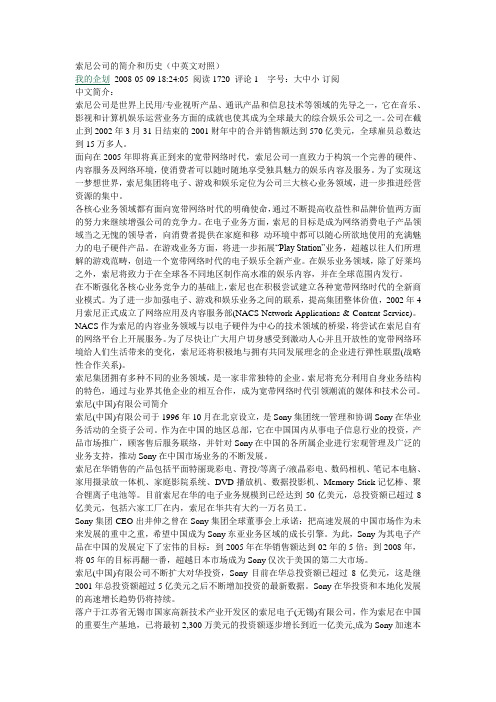
索尼公司的简介和历史(中英文对照)我的企划2008-05-09 18:24:05 阅读1720 评论1 字号:大中小订阅中文简介:索尼公司是世界上民用/专业视听产品、通讯产品和信息技术等领域的先导之一,它在音乐、影视和计算机娱乐运营业务方面的成就也使其成为全球最大的综合娱乐公司之一。
公司在截止到2002年3月31日结束的2001财年中的合并销售额达到570亿美元,全球雇员总数达到15万多人。
面向在2005年即将真正到来的宽带网络时代,索尼公司一直致力于构筑一个完善的硬件、内容服务及网络环境,使消费者可以随时随地享受独具魅力的娱乐内容及服务。
为了实现这一梦想世界,索尼集团将电子、游戏和娱乐定位为公司三大核心业务领域,进一步推进经营资源的集中。
各核心业务领域都有面向宽带网络时代的明确使命,通过不断提高收益性和品牌价值两方面的努力来继续增强公司的竞争力。
在电子业务方面,索尼的目标是成为网络消费电子产品领域当之无愧的领导者,向消费者提供在家庭和移动环境中都可以随心所欲地使用的充满魅力的电子硬件产品。
在游戏业务方面,将进一步拓展“Play Station”业务,超越以往人们所理解的游戏范畴,创造一个宽带网络时代的电子娱乐全新产业。
在娱乐业务领域,除了好莱坞之外,索尼将致力于在全球各不同地区制作高水准的娱乐内容,并在全球范围内发行。
在不断强化各核心业务竞争力的基础上,索尼也在积极尝试建立各种宽带网络时代的全新商业模式。
为了进一步加强电子、游戏和娱乐业务之间的联系,提高集团整体价值,2002年4月索尼正式成立了网络应用及内容服务部(NACS-Network Applications & Content Service)。
NACS作为索尼的内容业务领域与以电子硬件为中心的技术领域的桥梁,将尝试在索尼自有的网络平台上开展服务。
为了尽快让广大用户切身感受到激动人心并且开放性的宽带网络环境给人们生活带来的变化,索尼还将积极地与拥有共同发展理念的企业进行弹性联盟(战略性合作关系)。
索尼的企业文化
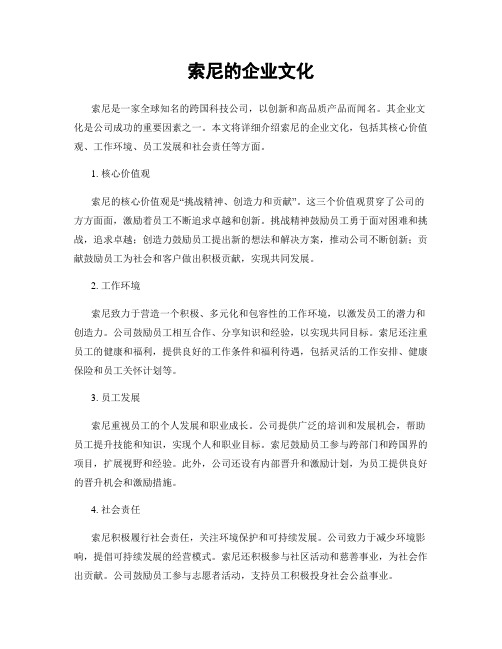
索尼的企业文化索尼是一家全球知名的跨国科技公司,以创新和高品质产品而闻名。
其企业文化是公司成功的重要因素之一。
本文将详细介绍索尼的企业文化,包括其核心价值观、工作环境、员工发展和社会责任等方面。
1. 核心价值观索尼的核心价值观是“挑战精神、创造力和贡献”。
这三个价值观贯穿了公司的方方面面,激励着员工不断追求卓越和创新。
挑战精神鼓励员工勇于面对困难和挑战,追求卓越;创造力鼓励员工提出新的想法和解决方案,推动公司不断创新;贡献鼓励员工为社会和客户做出积极贡献,实现共同发展。
2. 工作环境索尼致力于营造一个积极、多元化和包容性的工作环境,以激发员工的潜力和创造力。
公司鼓励员工相互合作、分享知识和经验,以实现共同目标。
索尼还注重员工的健康和福利,提供良好的工作条件和福利待遇,包括灵活的工作安排、健康保险和员工关怀计划等。
3. 员工发展索尼重视员工的个人发展和职业成长。
公司提供广泛的培训和发展机会,帮助员工提升技能和知识,实现个人和职业目标。
索尼鼓励员工参与跨部门和跨国界的项目,扩展视野和经验。
此外,公司还设有内部晋升和激励计划,为员工提供良好的晋升机会和激励措施。
4. 社会责任索尼积极履行社会责任,关注环境保护和可持续发展。
公司致力于减少环境影响,提倡可持续发展的经营模式。
索尼还积极参与社区活动和慈善事业,为社会作出贡献。
公司鼓励员工参与志愿者活动,支持员工积极投身社会公益事业。
综上所述,索尼的企业文化以挑战精神、创造力和贡献为核心价值观,致力于营造积极、多元化和包容性的工作环境,重视员工的个人发展和职业成长,积极履行社会责任。
这种企业文化的塑造使得索尼成为一家备受尊敬和信赖的公司,不断推动科技进步,为客户和社会创造价值。
Sony品牌管理方案(英文版)(ppt 56页)

Digital Dream Kids 1996 ~ Digital Dreams Kids are our Customers
In this Digital Era, we continue creating products that satisfy the dreams of our customers worldwide, who are captivated by the potential of digital technology.
We do not copy. We do things that no one else has done.
Masaru Ibuka
2000.11.2 Corporate AD
Brand Concept
Business Platform
Brand Essence
“What We Do”
Digital Dream Kids
Ideas that always surprise, and never disappoint.
Innovations that are easy to love, and effortless to use.
Things that are not essential, but hard to live without.
New Business Creation
Business Platform “What We Do”
Brand Essence “The Core”
Brand Vision “What We Will Be”
Brand Positioning “What We Say”
2000.11.2 Corporate AD
索尼企业文化
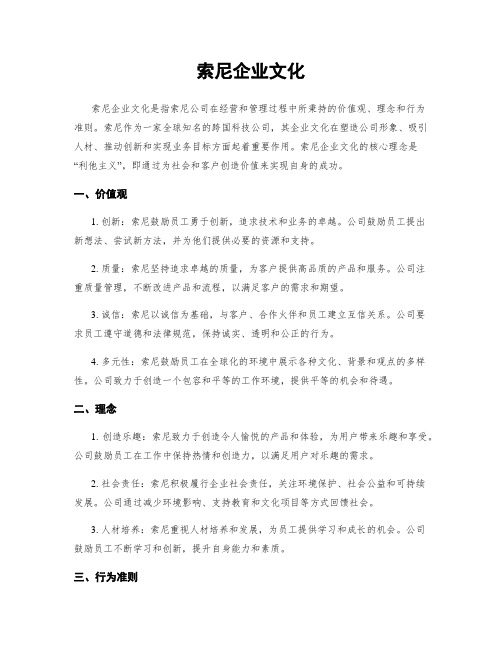
索尼企业文化索尼企业文化是指索尼公司在经营和管理过程中所秉持的价值观、理念和行为准则。
索尼作为一家全球知名的跨国科技公司,其企业文化在塑造公司形象、吸引人材、推动创新和实现业务目标方面起着重要作用。
索尼企业文化的核心理念是“利他主义”,即通过为社会和客户创造价值来实现自身的成功。
一、价值观1. 创新:索尼鼓励员工勇于创新,追求技术和业务的卓越。
公司鼓励员工提出新想法、尝试新方法,并为他们提供必要的资源和支持。
2. 质量:索尼坚持追求卓越的质量,为客户提供高品质的产品和服务。
公司注重质量管理,不断改进产品和流程,以满足客户的需求和期望。
3. 诚信:索尼以诚信为基础,与客户、合作火伴和员工建立互信关系。
公司要求员工遵守道德和法律规范,保持诚实、透明和公正的行为。
4. 多元性:索尼鼓励员工在全球化的环境中展示各种文化、背景和观点的多样性。
公司致力于创造一个包容和平等的工作环境,提供平等的机会和待遇。
二、理念1. 创造乐趣:索尼致力于创造令人愉悦的产品和体验,为用户带来乐趣和享受。
公司鼓励员工在工作中保持热情和创造力,以满足用户对乐趣的需求。
2. 社会责任:索尼积极履行企业社会责任,关注环境保护、社会公益和可持续发展。
公司通过减少环境影响、支持教育和文化项目等方式回馈社会。
3. 人材培养:索尼重视人材培养和发展,为员工提供学习和成长的机会。
公司鼓励员工不断学习和创新,提升自身能力和素质。
三、行为准则1. 尊重和合作:索尼鼓励员工相互尊重、理解和支持,建立和谐的工作关系。
公司倡导团队合作,鼓励员工分享知识和经验,共同实现目标。
2. 安全和健康:索尼致力于提供安全和健康的工作环境,保护员工的身体和心理健康。
公司严格遵守相关法律法规,采取措施预防和管理工作风险。
3. 责任和效率:索尼要求员工承担责任,高效执行工作任务。
公司鼓励员工制定明确的目标和计划,合理分配资源,提高工作效率和质量。
4. 沟通和透明:索尼倡导开放和透明的沟通方式,鼓励员工分享信息和意见。
企业文化英文介绍
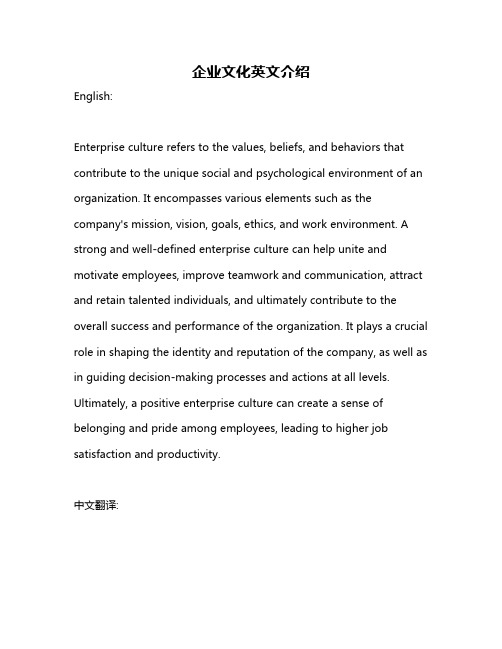
企业文化英文介绍English:Enterprise culture refers to the values, beliefs, and behaviors that contribute to the unique social and psychological environment of an organization. It encompasses various elements such as the company's mission, vision, goals, ethics, and work environment. A strong and well-defined enterprise culture can help unite and motivate employees, improve teamwork and communication, attract and retain talented individuals, and ultimately contribute to the overall success and performance of the organization. It plays a crucial role in shaping the identity and reputation of the company, as well as in guiding decision-making processes and actions at all levels. Ultimately, a positive enterprise culture can create a sense of belonging and pride among employees, leading to higher job satisfaction and productivity.中文翻译:企业文化是指对组织独特的社会和心理环境有所贡献的价值观、信念和行为。
SONY的价值观
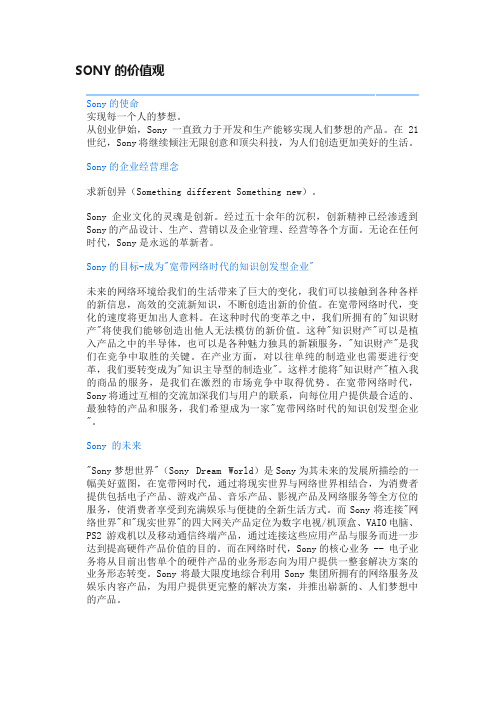
SONY的价值观Son y的使命实现每一个人的梦想。
从创业伊始,Sony一直致力于开发和生产能够实现人们梦想的产品。
在21世纪,Sony将继续倾注无限创意和顶尖科技,为人们创造更加美好的生活。
Sony的企业经营理念求新创异(Something different Something new)。
Sony企业文化的灵魂是创新。
经过五十余年的沉积,创新精神已经渗透到Sony的产品设计、生产、营销以及企业管理、经营等各个方面。
无论在任何时代,Sony是永远的革新者。
Sony的目标-成为"宽带网络时代的知识创发型企业"未来的网络环境给我们的生活带来了巨大的变化,我们可以接触到各种各样的新信息,高效的交流新知识,不断创造出新的价值。
在宽带网络时代,变化的速度将更加出人意料。
在这种时代的变革之中,我们所拥有的"知识财产"将使我们能够创造出他人无法模仿的新价值。
这种"知识财产"可以是植入产品之中的半导体,也可以是各种魅力独具的新颖服务,"知识财产"是我们在竞争中取胜的关键。
在产业方面,对以往单纯的制造业也需要进行变革,我们要转变成为"知识主导型的制造业"。
这样才能将"知识财产"植入我的商品的服务,是我们在激烈的市场竞争中取得优势。
在宽带网络时代,Sony将通过互相的交流加深我们与用户的联系,向每位用户提供最合适的、最独特的产品和服务,我们希望成为一家"宽带网络时代的知识创发型企业"。
Sony 的未来"Sony梦想世界"(Sony Dream World)是Sony为其未来的发展所描绘的一幅美好蓝图,在宽带网时代,通过将现实世界与网络世界相结合,为消费者提供包括电子产品、游戏产品、音乐产品、影视产品及网络服务等全方位的服务,使消费者享受到充满娱乐与便捷的全新生活方式。
- 1、下载文档前请自行甄别文档内容的完整性,平台不提供额外的编辑、内容补充、找答案等附加服务。
- 2、"仅部分预览"的文档,不可在线预览部分如存在完整性等问题,可反馈申请退款(可完整预览的文档不适用该条件!)。
- 3、如文档侵犯您的权益,请联系客服反馈,我们会尽快为您处理(人工客服工作时间:9:00-18:30)。
The culture differences between Sony and B&O The focus of our comparative analysis lies on two multinational corporations competing within the business of audio-video equipment. The two corporations are the Japanese company, Sony, and the Danish company, Bang&Olufsen (B&O). These two corporations were chosen primarily because the two were in the same business which sets the basis for our comparison. Secondly, we feel that the Japanese and the Danish culture appear to be very dissimilar. Finally, we chose the two because of the accessibiliy of useful information regarding them.As Sony and B&O are in the same business, one can discuss to some degree, that these two companies are competing for same customer groups; Sony is high volume orientated, whereas B&O is using a strategy of focus. B&O is differentiating itself by offering distinctive products with focus on design that appeal to high-scale customers. Although the two companies are not targeting on the same market, their business environment is similar in the aspect that they both produce high quality audio-video equipment targeted to the global market. Because of the distinct difference in national backgrounds of the two and despite somewhat different marketing strategies, we believe it will be interesting to compare the two.Power distanceThe first dimension in a "natural" culture, called Power Distance, indicates to what extent the society accepts that an organizations is controlling the power, and the organization is distributing this power in its particular way. This belief is reflected in the minds of both powerful as well as less powerful members of the society. The dimension can be considered as the degree of inequality among people in a country that is "accepted" by the people of that specific country. This ranges from relatively equal to extremely unequal. We have chosen the following examples as extreme examples of how the mindset of the society of a country could be. This is as said "the extremes," therefore, almost everybody should fit into somewhere between the two extremes: Table 2.1: The Power Distance DimensionThe scores for the Power Distance dimension are respectively; 20 for Denmark’s concern, and 54 for Japan. Hofstede has categorized the results on every dimensions of the countries into the following three categories: high, medium and low. One thirds of all the countries is represented in each category. The results in the Power Distance dimension puts Denmark into the category of low Power Distance culture, although Denmark is near to the category called medium in which Japan is presently represented.The problem-formulation listed five hypotheses. The hypotheses are our expectations pertaining differences in the HRM approach of Sony and B&O. But how exactly will these differences reveal themselves in relation to human resource management in the respective companies and Hofstede’s five dimensions?Our first hypothesis expects the power distance in Sony to be larger than that in B&O We assume this will reveal itself by the following characteristics:•Sony has a higher pay differentials between boss and employees.•Sony has more formal relationship and formal communication.•B&O’s employees generally have more informal relationship with their employer.IndividualismThe second dimension is individualism. It concerns the degree to which people in a country prefer to act as an individual or as a member of a group. The opposite extreme to individualism is collectivism. Collectivism is characterized as low individualism. In a collectivist-oriented culture one learns to respect the group. It is typically family, organization, or clan that serves as a platform for a group, and one learns to respect the members. One expects a group to protect themselves as its members. As a member of a collectivistic culture, one differentiates between in-group members and out-group members. In countries with a individualistic culture, one is educated to think of oneself as "I" instead of as a part of "we." One learns how to stand on one’s own feet, and accordingly, feels a very low loyalty to the group. On the other hand, one also doesn’t expect that the group will stand up for one in retuen. The extremes on the Individualism-collectivism dimension, in a negotiation perspective is described in the following:Table 2.2: The Individualism DimensionThere is also a difference between the Individualism dimension. Denmark has scored 75 on this dimension. As Denmark is considered as a "high individual culture," Denmark differed somewhat from Japan which only scored 46, which indicated a medium collectivistic culture.In relation to our hypothesis, the values of B&O compared with that of Sony is more individualistic; we expect following findings:•Sony is, to a higher extent, looking for potential employees with teamwork-skills.•The one time annual hiring done by Sony creates a belonging to a group of a certain group year.•Bonus and salary are based on seniority and department- and company-performance.•B&O’s salary are based on individual performance.•Training-sessions in Sony try to create teamwork by excursions, parties etc.•Sony try to occupy their employees in their spare time.MasculinityThe third dimension is called masculinity, and its opposite pole is femininity, just as the collectivism was the opposite pole to individualism. The dimension explains to what degree the "tough" values (masculine values) prevails over the "tender" values which are associated with the role of women. The "tough"/masculine cultural values cover such areas as money, assertiveness, performance, success and competition. The "tender"/feminine values are values like quality of life, maintaining warm personal relationships, service, a care for the weak, and solidarity. Although roles of women and men differ from country to country, the masculine societies are characterized by the larger differences between the role of men and women. The most relevant and extreme poles on the masculinity are listed below:Table 2.3: The Masculinity DimensionsThe margin between the scores for Denmark and Japan on the masculinity reveals a large difference in relation to this particular category. The score is 17 for Denmark, indicating one of the most feminine countries, whereas Japan is the most masculine country with a score of 95.Assuming that the values of Sony is much more masculine compared with that of B&O, by putting this into the perspective of HRM-strategies it could reveal itself by following:•In the management in B&O there is a higher percentage of women•Women in Sony are not recieving the same amount of training as the male counterparts.•Women in Sony are getting a lower salary compared to their male counterparts•Men and women are provided in B&O equal opportunities for promotion•Sony’s employee value salary as the most important motivator•Competition within Sony is tougher than in B&O•Sony tries to create a more competitive atmosphere within the companyUncertainty AvoidanceThe fourth dimension is labeled uncertainty avoidance, and refers to the extent to which people prefer structured vagainst unstructured situations. A structured situation is one characterized by many rules, and an individual employee always knows what he/she should behave and what is expected of him/her in a specific situation. The rules can be written or unwritten, similar to traditions. The main thing is that individuals are aware of these rules. Countries which score high on uncertainty avoidance have much nervous energy towards the unknown. Countries which score low on the dimension consists ofpeople that are characterized as more "easy going". A weak uncertainty avoidance can be characterized as more flexible culture.Table 2.4: The Uncertainty Avoidance DimensionThe Uncertainty avoidance dimension indicates a large difference between Denmark and Japan, and perhaps ultimately between Sony and B&O. Denmark is categorized as a low certainty avoidance country (a score of 26) and Japan falls under the label of high certainty avoidance countries (a score of 92).The HRM policies in B&O is reflecting a lower degree of uncertainty avoidance than in Sony. Some areas of HRM that we are able to measure a lower degree of uncertainty avoidance are:•The Sony employee has a higher extent of guidance during training.•Sony checks the performance of their employee more frequently.•B&O’s ETD is left to the individual employee.•Long-term employment is relatively more important for an employee of SonyLong term orientationThe fifth and last dimension in the "extended" framework is long-term vs. short-term orientation. Countries which score high on this dimension value future obligations, and future opportunities. The countries which score low can be characterized as short-term oriented. They are oriented towards the present and consider the following as important: experience and fulfilling social obligations.We find the following three factors as the most important polar extremes regarding to HRM.Table 2.5: Long Term OrientationAs this dimension has not yet been measured in Danish corporations, we make an assumption that Denmark lies in between Holland and Germany in the interval of 31 to 44, which Hofstede categorizes as the medium group. The differences between Denmark and Japan on this dimensions is relatively large, as Japan scores 80. Its not surprising that Japan scores high on this dimension, keeping in mind, this dimensions is "rooted" in the values of Confucius, the Chinese philosopher of 500 BC. However, Japan does score lower than many of the Southeast Asian countries.Compared to B&O, Sony has longer term orientation. But what implications does this have on HRM? We think the following could indicate a longer term orientation.•B&O believes that international experience outside of the company is a plus to an employee.•Sony values the importance of employee training as the company expects to have the employee for a long term•Sony´s management is recruited from within the company•B&O is more likely to hire experienced persons.SummaryAs discussed above, the cultural differences between Denmark and Japan are noticeable. These differences have background in history, geographic influence and several other factors. The Japanese culture profile could be overall defined as medium on Power Distance and Individualism and high on the remaining three dimensions. Denmark can be defined as having low Power distance and low Uncertainty Avoidance, high on Individualism, very feminine and medium term oriented.。
